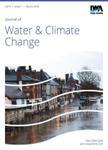版权所有:内蒙古大学图书馆 技术提供:维普资讯• 智图
内蒙古自治区呼和浩特市赛罕区大学西街235号 邮编: 010021

作者机构:Int Inst Informat Technol Lab Spatial Informat Hyderabad 500032 Telangana India Indian Inst Technol Delhi Dept Civil Engn New Delhi 110016 India
出 版 物:《JOURNAL OF WATER AND CLIMATE CHANGE》 (水与气候杂志)
年 卷 期:2018年第9卷第3期
页 面:512-524页
核心收录:
学科分类:07[理学] 070601[理学-气象学] 0815[工学-水利工程] 0706[理学-大气科学]
主 题:Canonical Correlation Analysis Copula multiple logistic regression model QUAL2 K statistical downscaling
摘 要:A river water quality management model under average climatic conditions may not be able to account for the extreme risk of low water quality which is more prominent under an increase in river water temperature and altered river flows. A modeling framework is developed to assess the risk of river low water quality extremes by integrating a statistical downscaling model based on Canonical Correlation Analysis, risk quantification model based on Frank Archimedean Copula function and multiple logistic regression model integrated with a river water quality simulation model, QUAL2 K. The results reveal that the combination of predicted decrease in low flows of approximately 57% and increase in maximum river water temperatures of approximately 1.2 degrees C has shown an increase of about 46% in risk of low water quality conditions for the future scenarios along Tunga-Bhadra River, India. The extreme risk of low water quality is observed to increase by 50.6% for the period 2020-2040 when compared with the current extreme conditions of 4.5% and average risk conditions of about 3% for the period 1988-2005. The study captured the occurrence of extremes of low water quality with evidence of a strong link between climate and water quality impairment events.